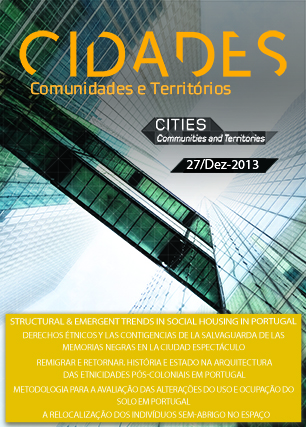A relocalização dos indivíduos sem-abrigo no espaço público
DOI:
https://doi.org/10.7749/citiescommunitiesterritories27311Palabras clave:
Espaço público, Fenómeno dos sem-abrigo, Heterotopia, Hospitalidade mixofóbicaResumen
Nas últimas décadas, a orientação económica do espaço público acentuou-se e este tornou-se menos hospitaleiro para os indivíduos sem-abrigo, resultando numa diminuição das suas possibilidades de sobrevivência. A tensão tradicional entre hospitalidade e inospitalidade como estratégias para lidar com os pobres visíveis está a ser reconfigurada nas sociedades ocidentais contemporâneas, criando uma forma de hospitalidade baseada na rejeição activa da interacção com a alteridade-desqualificada-porque-pobre. Esta forma de hospitalidade mixofóbica tem o efeito de reduzir o número e os tipos de espaços em que os indivíduos sem-abrigo são bem-vindos. Indesejados nestes espaços públicos, estes sujeitos são relocalizados para serviços destinados a sem-abrigo e para outros locais heterotópicos aos quais as classes médias e elites não têm interesse em ir, indicando uma tendência de diferenciação espacial entre «os nossos lugares» e «os lugares dos outros».
Descargas
Publicado
Número
Sección
Licencia
Cidades, Comunidades e Territórios by DINÂMIA'CET-IUL is licensed under a Creative Commons Atribuição-Uso Não-Comercial-Proibição de realização de Obras Derivadas 4.0 Unported License.Permissions beyond the scope of this license may be available at mailto:cidades.dinamiacet@iscte.pt.






